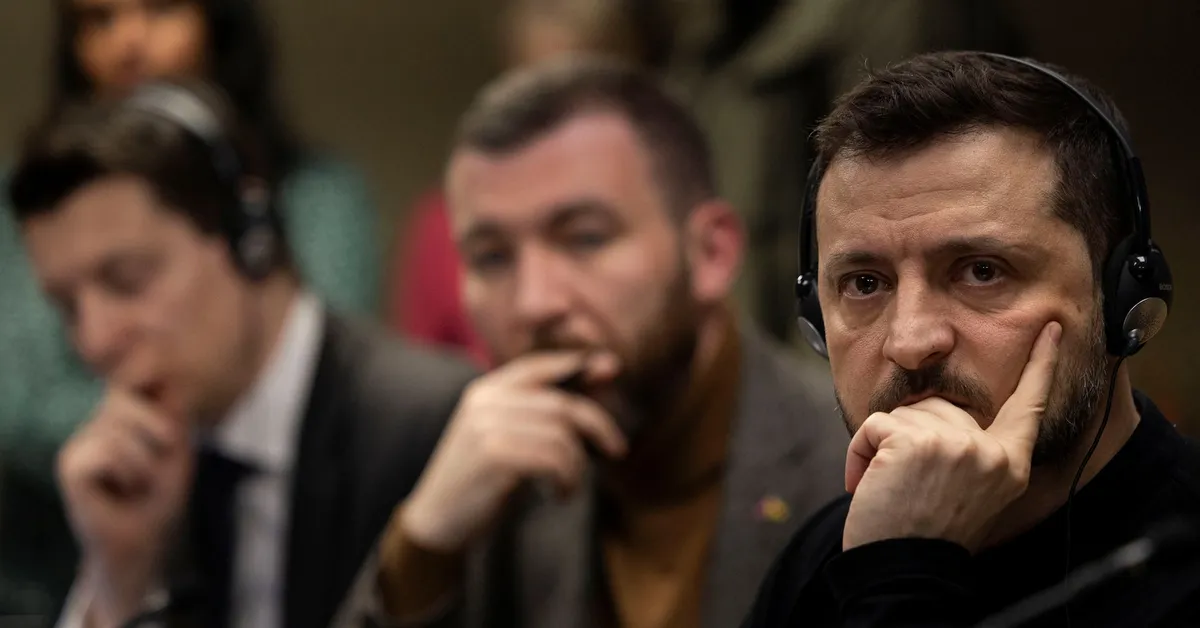
On March 2, a significant political development unfolded as top Republicans aligned with former U.S. President Donald Trump intensified their demands for Ukrainian President Volodymyr Zelenskiy to reassess his stance on the ongoing war with Russia. This pressure escalated after a contentious meeting at the White House the previous week, where tensions flared between Trump, Vice President JD Vance, and Zelenskiy, leading to the Ukrainian leader departing prematurely without finalizing a planned minerals deal.
In stark contrast to the pressure from U.S. Republicans, European leaders expressed solidarity with Zelenskiy during a meeting in London on the same day. British Prime Minister Keir Starmer called on his counterparts to enhance their defense efforts, highlighting the urgent need for a unified front against Russian aggression. The clash between Trump, Vance, and Zelenskiy raised global concerns regarding the future of the war that Russia initiated by invading Ukraine three years ago, as well as Trump's controversial approach to resolving it.
During the Oval Office meeting, Zelenskiy articulated his belief that Russian President Vladimir Putin had violated a 2019 ceasefire agreement, labeling him a killer and a terrorist. In response, Trump’s national security adviser, Mike Waltz, stated that there were doubts within the administration about Zelenskiy's willingness to negotiate an end to the conflict. Waltz emphasized that Trump envisions a permanent peace between Moscow and Kyiv, contingent on territorial concessions in exchange for security guarantees led by Europe.
When asked if Trump sought Zelenskiy's resignation, Waltz expressed the need for a leader who could engage effectively with both the U.S. and Russia to bring an end to the war. He remarked, "If it becomes apparent that President Zelenskiy's either personal motivations or political motivations are divergent from ending the fighting in his country, then I think we have a real issue on our hands."
Senator Lindsey Graham of South Carolina, a prominent Trump ally and supporter of Ukraine, raised concerns about the United States' ability to collaborate with Zelenskiy following the White House incident. Similarly, House Speaker Mike Johnson echoed this sentiment, stating that a change is necessary, urging Zelenskiy to reassess his position or for a new leader to emerge.
In a robust defense of Zelenskiy, U.S. Senator Bernie Sanders, an independent aligned with the Democrats, condemned the notion of his resignation. Sanders asserted that Zelenskiy is valiantly defending democracy against an authoritarian regime. Republican Senator James Lankford also opposed the calls for Zelenskiy to step down, emphasizing the need for unity in facing the Russian threat.
Democratic leaders expressed outrage over the tone of the meeting, with Senator Chris Murphy criticizing the White House for appearing more aligned with Russia than with democratic allies. Murphy described the meeting's premise as an attempt to rewrite history in a way that could favor Putin, which he deemed disastrous for U.S. national security.
In response to assertions that the meeting was an ambush, Waltz labeled those claims as “absolutely false” and reiterated that the Trump administration is waiting for Ukraine to adjust its position. Secretary of State Marco Rubio added that he had not spoken with Zelenskiy or Ukrainian Foreign Minister Andrii Sybiha since the meeting. He emphasized the need for peace negotiations, stating, “You’re not going to bring them to the table if you’re calling them names, if you’re being antagonistic.”
Meanwhile, Senator Amy Klobuchar expressed her dismay over the Oval Office clash and remarked that there remains an opportunity for a peace deal, highlighting the ongoing complexities of the situation.
As the dynamics of U.S.-Ukraine relations continue to evolve, the future of the conflict and the international response will remain critical topics in the coming weeks.